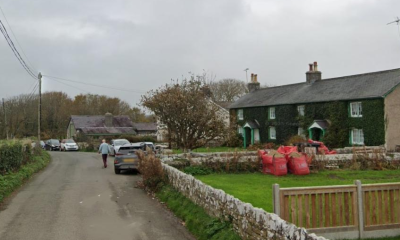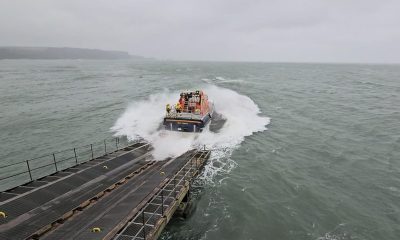News
Infection contributed to student’s fatal fall


Patrick Dear: Fell from a height at Dale Fort
AN INQUEST into the death of a 16–year–old schoolboy who was found at the foot of Dale Point was held at Milford Town Hall today (March 3).
Patrick Dear, of Essex, had been on a geography field trip to Dale Fort in March last year.
He was described by Coroner’s Officer Jeremy Davies as a ‘keen sportsman’ with ‘no concerns’.
The A–Level student, who had hoped to pursue a career in construction, would later be found at the base of the 120–foot cliffs that surround the former Victorian Fort.
A pathologist’s report described Paddy’s injuries as ‘severe’ and ‘in keeping with a fall from height’.
It also revealed that Paddy had been suffering from group A streptococcal septicemia, a ‘systemic infection’, which could cause ‘disorientation, confusion, unsteadiness and an inability to comprehend dangerous situations’.
The report concluded that this ‘infection contributed to his fall’.
Some of Paddy’s classmates from Campion school in Hornchurch, Essex, had said he ‘appeared restless’ and had experienced difficulty sleeping during his time at the Fort.
On March 17 at around 5.30pm, Paddy asked to be excused from a lesson to go to the toilet; however, he did not return.
When teachers became aware of Paddy’s disappearance, they alerted staff at the Fort, and after an initial search proved unsuccessful, police were informed at 7.05pm.
The search would continue into the early hours of the following day, with teams from Dyfed–Powys Police, which included a helicopter, and the Coastguard eventually finding Paddy’s body at around 1am.
While Paddy’s whereabouts prior to his death were unknown to staff at the Fort, Judith Curry, who lives on the seafront in Dale, was able to shed some light on his final hours.
Ms Curry recalled how she had been out in her front garden at around 6pm on March 17 when she saw a ‘young man’, who she would later identify as Paddy, standing near the seafront wall.
The Dale resident said she had been concerned about the student’s demeanour, adding that he had been ‘pacing up and down’ and ‘looking out to sea an awful lot’.
Ms Curry stated: “I would not say he was in control – he looked agitated.”
When she returned to her garden at around 8pm to find that Paddy had gone, Ms Curie said: “If he had still been there I would have gone over to him.”
A staff member at the Fort, Elizabeth Western recalled how she had ‘never had any issues with Paddy’, describing him as ‘quiet’.
The field trip had seen the pupils travel to several parts of Pembrokeshire, including Newgale, Tenby and Milford Haven; although Ms Western stated that whilst students are in the Fort, ‘the village is definitely out of bounds’.
She added that the Fort is occupied by at least one member of staff at all times and students have to sign in and out should they leave the premises.
At this point, Paddy’s mother, Patricia Dear, took the opportunity to ask Ms Western if the Fort had ‘someone standing on the gate’ during the search, to which Ms Western said they did not.
Head of Field Studies Council Pembrokeshire, Christine Milligan, who oversees Dale Fort and a similar centre at Orielton, said how the students would have been ‘warned of the dangers of the cliffs around the site’ on arrival, and that the Fort operates strict protocols in the event of a missing student.
She added that the search for Paddy had been ‘comprehensive’, with staff members having ‘searched systematically’.
Ms Milligan also said how deputy head teachers of Campion school, along with Paddy’s mother and other family members had began making the journey to Pembrokeshire in the hours after he was announced missing.
Speaking to Ms Milligan, Mrs Dear said: “Nothing we do today will bring Paddy back.”
She went on to raise questions over whether there had been any changes implemented since Paddy’s death, and in particular, if the Fort would now position someone on the gate if a similar event was to take place.
Raising concerns over the safety of future students visiting the site, Mrs Dear added: “In terms of security […] there is nothing stopping access to the public.”
Ms Milligan, who said that locking the gates in this instance would have likely not made a difference, responded: “We will certainly consider all issues raised here and look at what we can do if this awful situation was to happen again.”
Coroner Mark Layton recorded a narrative conclusion, saying that Paddy had died as a result of a fall from height whilst suffering from the systemic infection.
Mr Layton expressed his sincere condolences to Mr and Mrs Dear.
News
Vote.wales: Information website launched to give people voting confidence

Vote.wales to host all essential election information for the Senedd election
A BRAND new voter information website, vote.wales, has been launched today (2 March) by the Electoral Management Board for Wales, part of the Democracy and Boundary Commission Cymru.
Vote.wales is the first website of its kind in Wales and tells people everything they need to know about the election, including advice about voting, information about the Senedd, and a postcode search function to provide tailored local information.
The website holds information about who can register to vote, how voting works in polling stations, as well as postal and proxy voting, and what accessibility support people can expect when they go to vote.
A postcode search function on vote.wales allows voters to see which of Wales’ 16 new constituencies they will be voting in, as well as telling them where their local polling station is located.
Once nominations have closed, the website will also inform voters which political parties and independent candidates are standing in their area.
The website explains how the Senedd works and what it does, highlighting which policy areas are devolved to the Senedd and which remain the responsibility of the UK Parliament. It also sets out the difference between the Senedd and the Welsh Government.
Further developments are expected in the coming weeks. In a first for Welsh elections, voters will soon be able to access detailed accessibility information about their local polling station. Political parties and independent candidates will also be able to publish their election leaflets on the platform, so voters can see not only who is standing but what they stand for.
Following the election, vote.wales will publish the full election results.
Commenting on the launch, Shereen Williams MBE OStJ, Chief Executive of the Democracy and Boundary Commission Cymru, said:
“An important election is coming on 7 May, and vote.wales is the place to go to find out all about it.
“We know that people across Wales are looking forward to making their voices heard at this election, but many people don’t feel they have all the information they need before they go and vote.
“If you have questions about this election, then head to vote.wales. Voting confidence starts here.”
Crime
Pencoed: Assault victim dies and murder investigation launched

THE POLICE investigation into the serious incident which happened on Felindre Road, Pencoed, in the early hours of Saturday, February 28, is now being treated as murder.
We can confirm the 58-year-old man who was critical in hospital passed away earlier today – his family are being supported by specially trained officers at this time, and our thoughts are with them.
The Major Crime Investigation Team at South Wales Police is now leading the investigation, and the 26-year-old man arrested remains in police custody.
Detectives investigating the incident are appealing to anyone who may have been in the vicinity of Felindre Road, Pencoed, between midnight and 5am on Saturday to get in touch.
Motorists are urged to their check dashcams for any footage which may be relevant.
Detectives would like to speak to two potential witnesses – two elderly people who are believed to have walked along Felindre Road between 12.30am and 4am on Saturday.
Detective Inspector Graham Williams, from the Major Crime Investigation Team, said: “Sadly, a 58-year-old man has died in hospital following the incident on Saturday morning. Our thoughts are with his family at this time and they are being supported. I would like to reassure the local community that we have somebody in custody and are not looking for anybody else at this time. I thank everyone in the community who has helped our investigation so far, and I urge anyone with information which may be relevant to our investigation – particularly the two potential witnesses – to get in touch.”
If anybody does have information, they should contact 101 quoting reference 2600063517. Alternatively, they can submit information via the Major Incident Public – https://mipp.police.uk/operation/62SWP26C30-PO1
Crime
School lockdown lifted after telephone threat as police continue enquiries

PUPILS and staff at Maesydderwen Comprehensive School in Ystradgynlais were released safely on Monday afternoon (Mar 2) after a lockdown was implemented following a reported telephone threat.
Dyfed-Powys Police confirmed officers were called to the school earlier in the day and worked with staff to ensure the safety of everyone on site. As a precaution, the school activated its lockdown procedure while enquiries were carried out.
Police said there were no reports of injuries and that all pupils and staff were safe and secure throughout the incident.
Officers remain at the scene while “diligent enquiries” into the threat continue. At this stage, no arrests have been made, and police have confirmed there is no evidence of any ongoing risk to pupils or staff.
Reassurance patrols will take place in the coming days to support pupils, staff, parents and the wider community.
Parents and guardians will continue to receive updates directly through the school messaging app, including confirmation on whether the school will open as normal on Tuesday.
Maesydderwen Comprehensive School is located in Ystradgynlais, Powys, and is served by Dyfed-Powys Police.
-

 News7 days ago
News7 days agoLabour and Plaid criticised over £1.2m anti-racism ‘metaverse’ project
-

 Health6 days ago
Health6 days agoHealth services row escalates as MSs demand action over Withybush and Bronglais
-

 Politics7 days ago
Politics7 days agoFarage vows to strip Cardiff’s ‘City of Sanctuary’ status ahead of manifesto launch
-

 Health5 days ago
Health5 days agoPetition calling for Withybush intervention nears 5,000 signatures
-

 News7 days ago
News7 days agoPlaid Cymru drug decriminalisation policy under spotlight ahead of Senedd election
-

 Business6 days ago
Business6 days agoCouncil reviewing complaints over Computer Solutions Wales as concerns continue
-

 News5 days ago
News5 days agoWelsh Government criticised after Russian-linked drone image used in defence announcement
-

 Business6 days ago
Business6 days agoBosherston Bistro 10pm alcohol licence granted by council






























